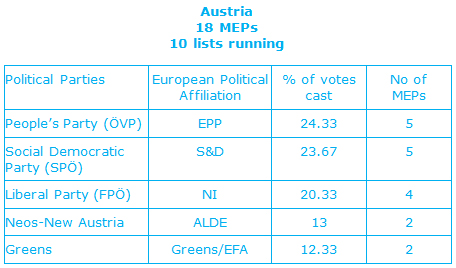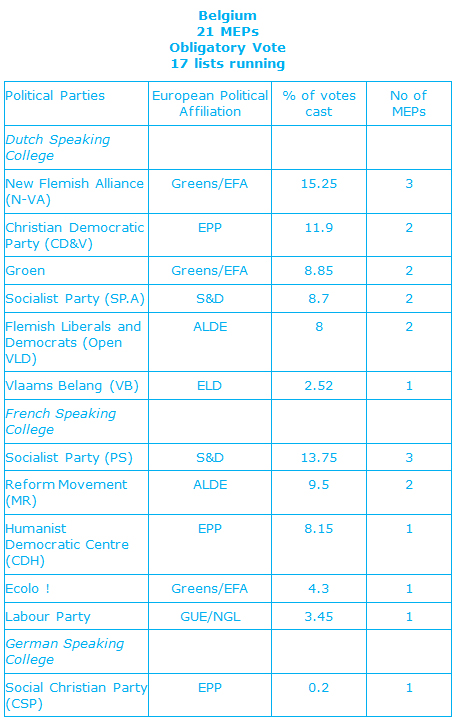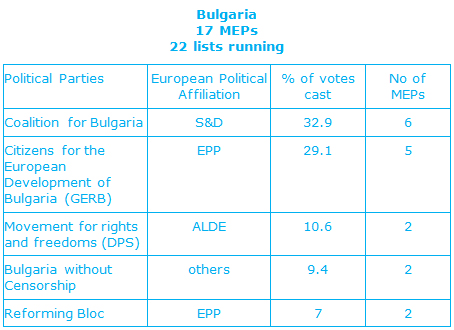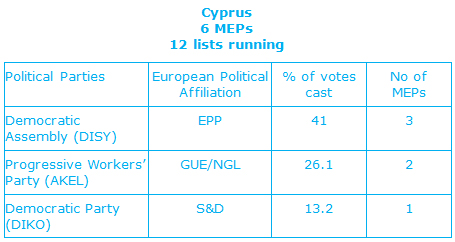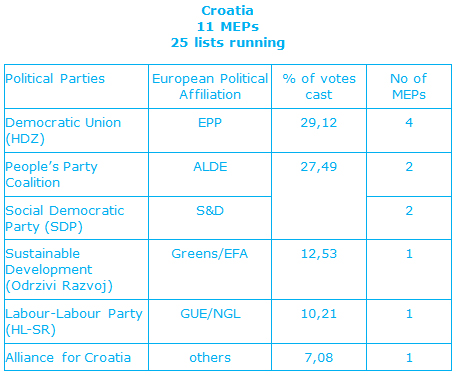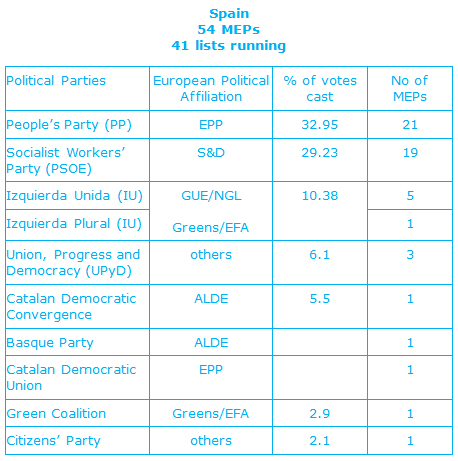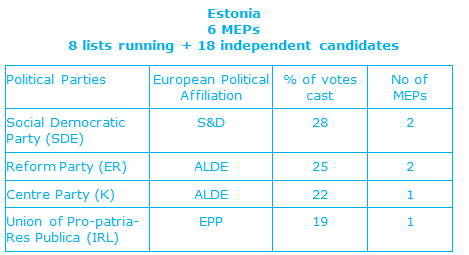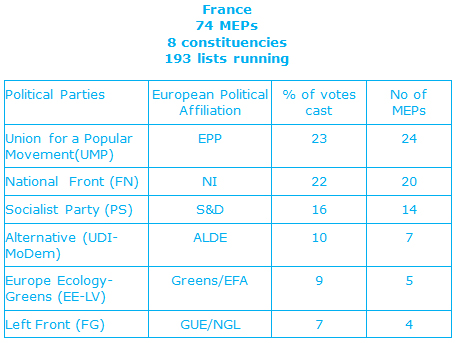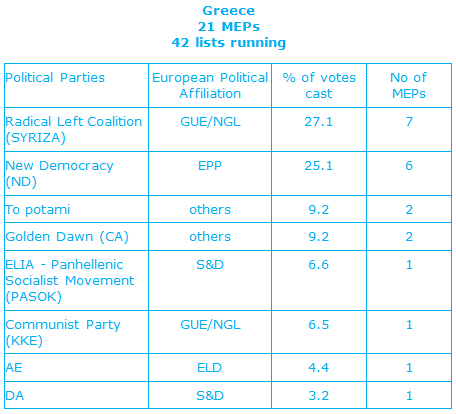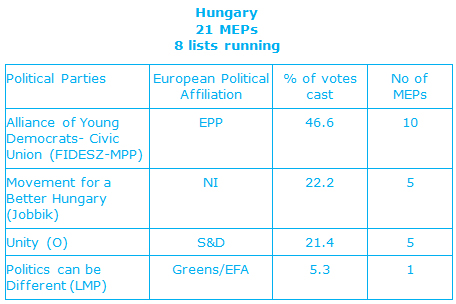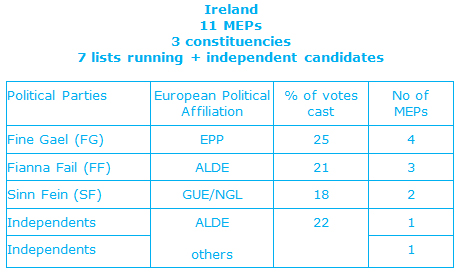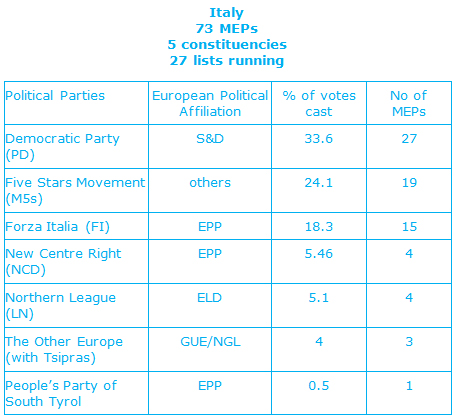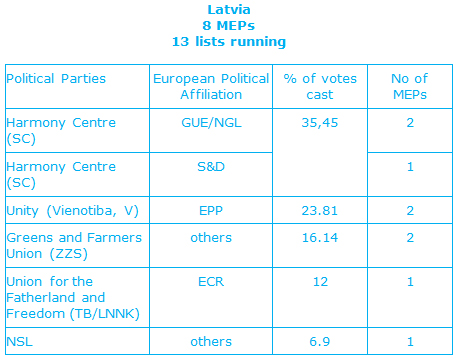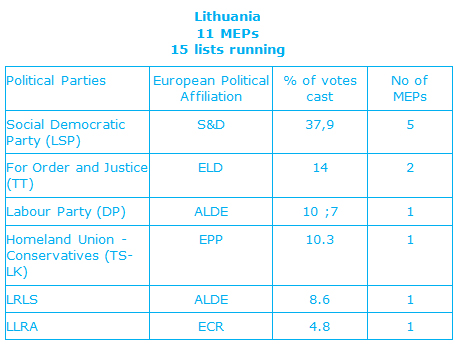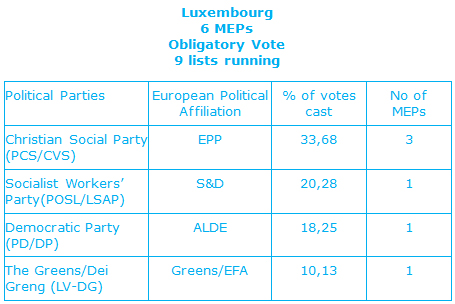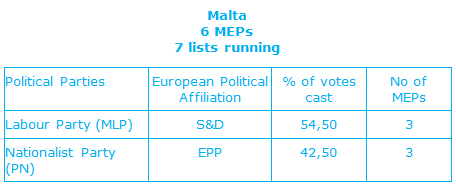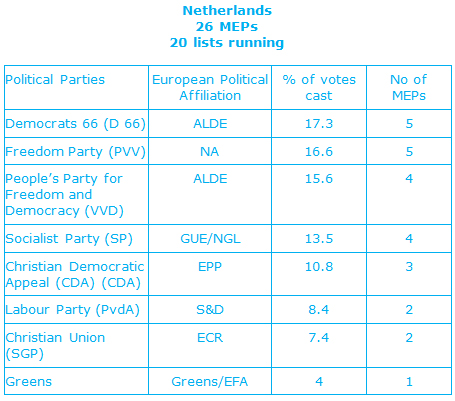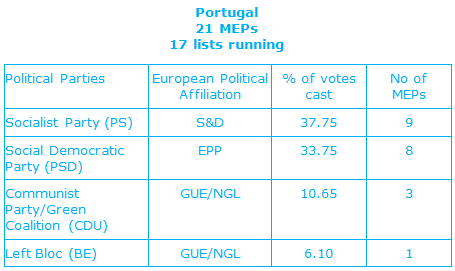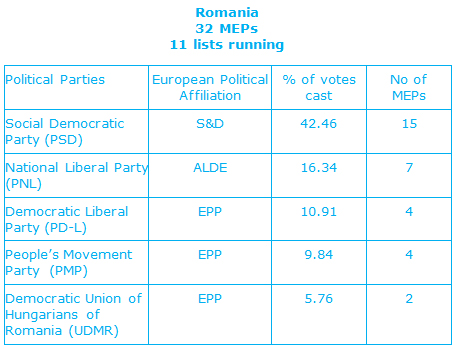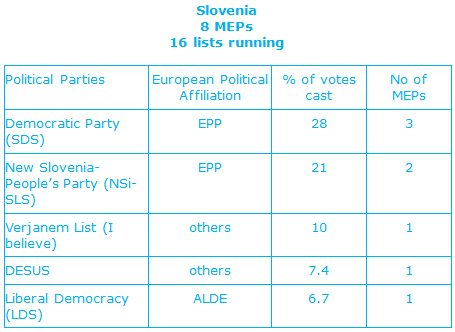Elections in Europe
Corinne Deloy
-

Available versions :
EN

Corinne Deloy
382 million citizens from 28 EU Member States are being called to ballot between 22nd and 25th May next to elect the 751 members of the European Parliament. The Dutch and the British will be voting on 22nd May; the Irish on 23rd, the Latvians, Slovakians and the Maltese on 24th, The Czechs on 23rd and 24th, and the Italians on 24th and 25th. The Europeans in the other 20 Member States will vote on 25th May[1].
The Lisbon Treaty signed in 2009 introduced a novelty: the European political parties can put forward their candidate for the post of President of the European Commission, a first in the Union's history. The European Council must take into account the results of the European election when appointing the President of the Commission who must then be approved by the majority of MEPs.
Former Prime Minister (1995-2013) of Luxembourg and former President of the Eurogroup (2005-2013), Jean-Claude Juncker (Social Christian Party, PCS/CVS), is the European People's Party candidate (EPP); Martin Schulz (Social Democratic Party SPD), present President of the European Parliament, is running for the Party of European Socialists (PES). The Alliance of Liberals and Democrats for Europe (ALDE) and the European Democratic Party (EDP) chose former Belgian Prime Minister (1999-2008) Guy Verhofstadt (Open VLD). José Bové (Europe Ecology-The Greens, EE-LV) and Franziska Keller (Die Grünen), both MEPs are running for the European Green Party (EGP). Finally Alexis Tsipras (Radical Left Coalition, SYRIZA) is the European Left's candidate (ELP).
The Alliance of European Conservatives and Reformers (CRE/ECR) and the European Alliance for Freedom chose not to put a candidate forward.
These five candidates have convened on three occasions for TV debates (28th April, 9th and 15th May)[2]. Other debates have involved Jean-Claude Juncker and Martin Schulz (9th April, 8th and 13th May)[3] A final dual will bring them together on 20th May.
Just one week before the election the gap between the EPP and the PES is still tight but the EPP remains in the lead. According to the polls the EPP is due to win between 212 and 221 MEPs. The Socialists and Democrats (S&D) are due to win between 194 and 209 MEPs. The ALDE is due to remain the third biggest group in the Strasbourg Assembly with between 45 to 52 MEPs. The ecologists (Greens/EFA) are due to have between 38 and 52 seats, the European Conservatives and Reformers (CRE/ECR), 43 or 44 MEPs and Europe for Freedom and Democracy (ELD/EFD), between 33 and 39 MEPs.
There remains the issue of the non-attached who, as they stand in their present form are due to win 38 seats. The parties which are not represented in Parliament at present and who might make their entry according to the polls without being able to tell at this stage with whom they will sit are due to win 62 seats.
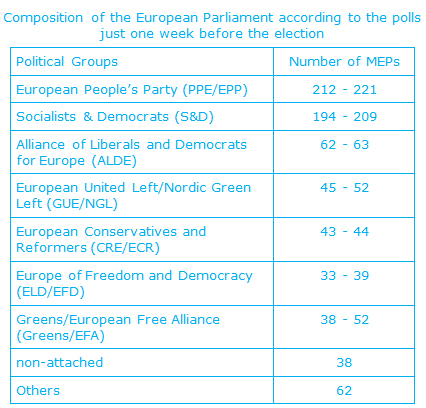 Sources : Internet Site http://www.electio2014.eu/fr/pollsandscenarios/polls and http://www.elections2014.eu/fr/news-room/...
Sources : Internet Site http://www.electio2014.eu/fr/pollsandscenarios/polls and http://www.elections2014.eu/fr/news-room/...
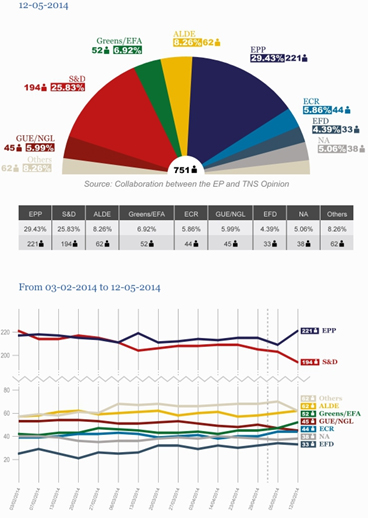
The right is due to win in 14 Member States: Germany, Austria, Belgium, Cyprus, Croatia, Spain, Finland, France, Hungary, Ireland, Luxembourg, the Netherlands, Poland and Slovenia. The left is due to win in ten countries: Bulgaria, Estonia, Italy, Latvia, Lithuania, Malta, Portugal, Romania, Slovakia and Sweden. In 4 Member States - Denmark, Greece, Czech Republic and the UK populist and eurosceptic parties on the right or the left may win - the Danish People's Party (DF), Syriza, Ano 2011 and the UK Independence Party (UKIP), respectively.
The Dutch Freedom Party (PVV), the Austrian Liberal Party (FPO), the French National Front (FN), the Belgian Vlaams Belang (VB), the Swedish Democrats (DS), the Italian Northern League (LN) and the Slovakian Nationalist Party (SNS), if this party have some candidates elected, might win 38 MEPs together and form a new group in the future European Parliament. With this be the only one?
Turn out might be less than in the last European election in 2009 (43.23%). Let us hope that the novelty introduced by the Lisbon Treaty that enables European citizens to appoint the President of the Commission indirectly and the debates organised between the candidates will have a positive effect on turn out. The European election must not - as the populists hope in all quarters - just become a vote for or against the European Union. Although the parliament in Strasbourg functions on a basis of negotiations and a quest for consensus, although it is a place where - in some instances - varied coalitions sometimes form - it remains that each party has its own view of the Union. On 22nd and 25th May next we shall have to choose the future policy of Europe from amongst the projects put forward.
Latest polls in the 28 Member States[4]
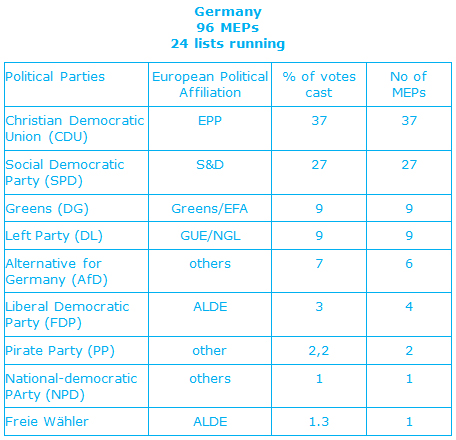 http://www.infratest-dimap.de/umfragen-...
http://elections-europeennes.robert-schuman.eu/en/fiche/allemagne/
http://www.infratest-dimap.de/umfragen-...
http://elections-europeennes.robert-schuman.eu/en/fiche/allemagne/
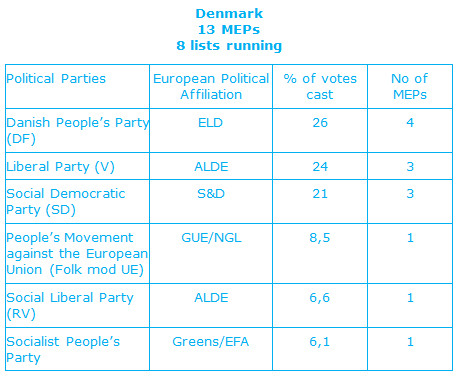 http://www.europeanvoice.com/page/4028.aspx?LG=1
http://elections-europeennes.robert-schuman.eu/en/fiche/danemark/
http://www.europeanvoice.com/page/4028.aspx?LG=1
http://elections-europeennes.robert-schuman.eu/en/fiche/danemark/
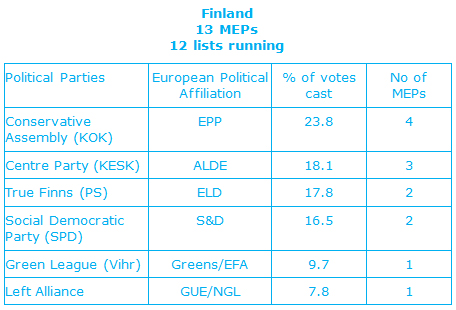 http://www.europeanvoice.com/page/4030.aspx?LG=1
http://elections-europeennes.robert-schuman.eu/en/fiche/finlande/
http://www.europeanvoice.com/page/4030.aspx?LG=1
http://elections-europeennes.robert-schuman.eu/en/fiche/finlande/
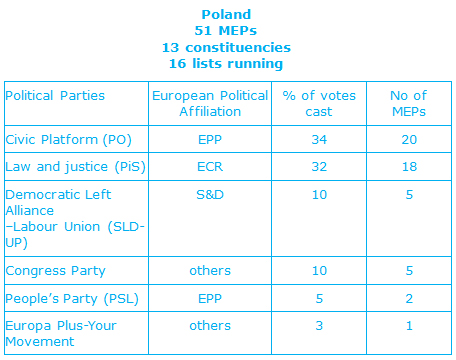 http://www.europeanvoice.com/page/4042.aspx?LG=1
http://elections-europeennes.robert-schuman.eu/en/fiche/pologne/
http://www.europeanvoice.com/page/4042.aspx?LG=1
http://elections-europeennes.robert-schuman.eu/en/fiche/pologne/
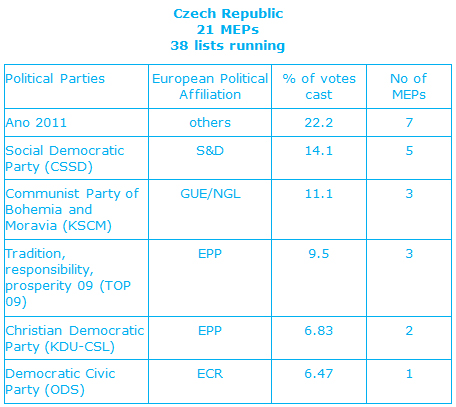 http://www.herzmann.cz/wp-content...
http://www.europeanvoice.com/page/4027.aspx?LG=1
http://elections-europeennes.robert-schuman.eu/en/fiche/republique-tcheque/
http://www.herzmann.cz/wp-content...
http://www.europeanvoice.com/page/4027.aspx?LG=1
http://elections-europeennes.robert-schuman.eu/en/fiche/republique-tcheque/
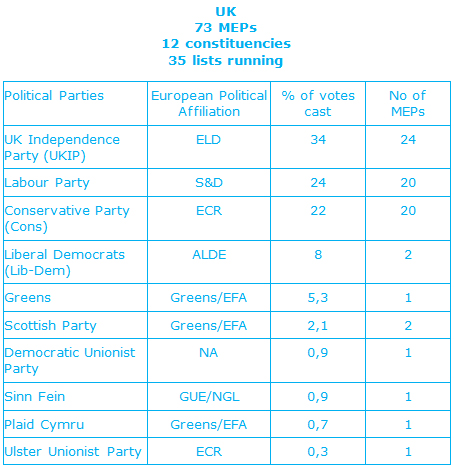 http://www.europeanvoice.com/page/4049.aspx?LG=1
http://elections-europeennes.robert-schuman.eu/fiche/royaume-uni/
http://www.europeanvoice.com/page/4049.aspx?LG=1
http://elections-europeennes.robert-schuman.eu/fiche/royaume-uni/
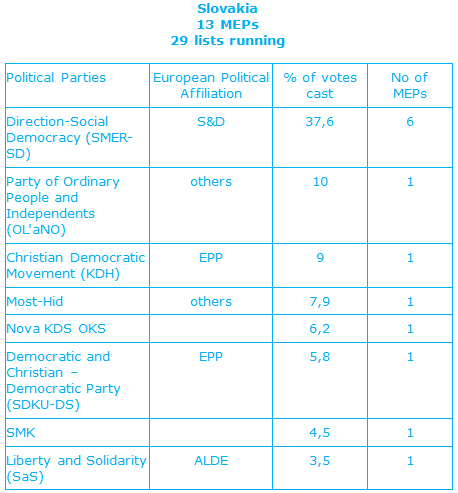 Source : MVK polling agency
http://elections-europeennes.robert-schuman.eu/fiche/slovaquie/
Source : MVK polling agency
http://elections-europeennes.robert-schuman.eu/fiche/slovaquie/
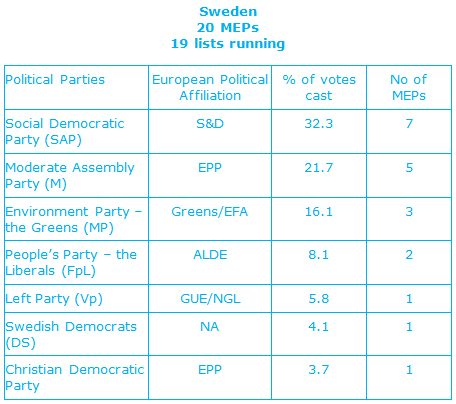 http://www.europeanvoice.com/page/4048.aspx?LG=1
http://elections-europeennes.robert-schuman.eu/en/fiche/suede/
http://www.europeanvoice.com/page/4048.aspx?LG=1
http://elections-europeennes.robert-schuman.eu/en/fiche/suede/
With Albert Aixala, Linda Berg, Karolien de Bruyn, Marie Demker, Jacob Christensen, Stellina Galitopoulou, Inga Groth, Alenka Krasovec, Rodolphe Laffranque, Helen Levy, Lukas Macek, Silviu Matei, Grigorij Meseznikov, Augsute Meskyte, Patrick Moreau, Philippe Poirier, Julia Ravaityte, Antti Timonen, Antony Todorov, Hanna Wass
On the same theme
To go further
Elections in Europe
Corinne Deloy
—
15 April 2025
Elections in Europe
Corinne Deloy
—
25 February 2025
Elections in Europe
Corinne Deloy
—
18 February 2025
Elections in Europe
Corinne Deloy
—
28 January 2025

The Letter
Schuman
European news of the week
Unique in its genre, with its 200,000 subscribers and its editions in 6 languages (French, English, German, Spanish, Polish and Ukrainian), it has brought to you, for 15 years, a summary of European news, more needed now than ever
Versions :

